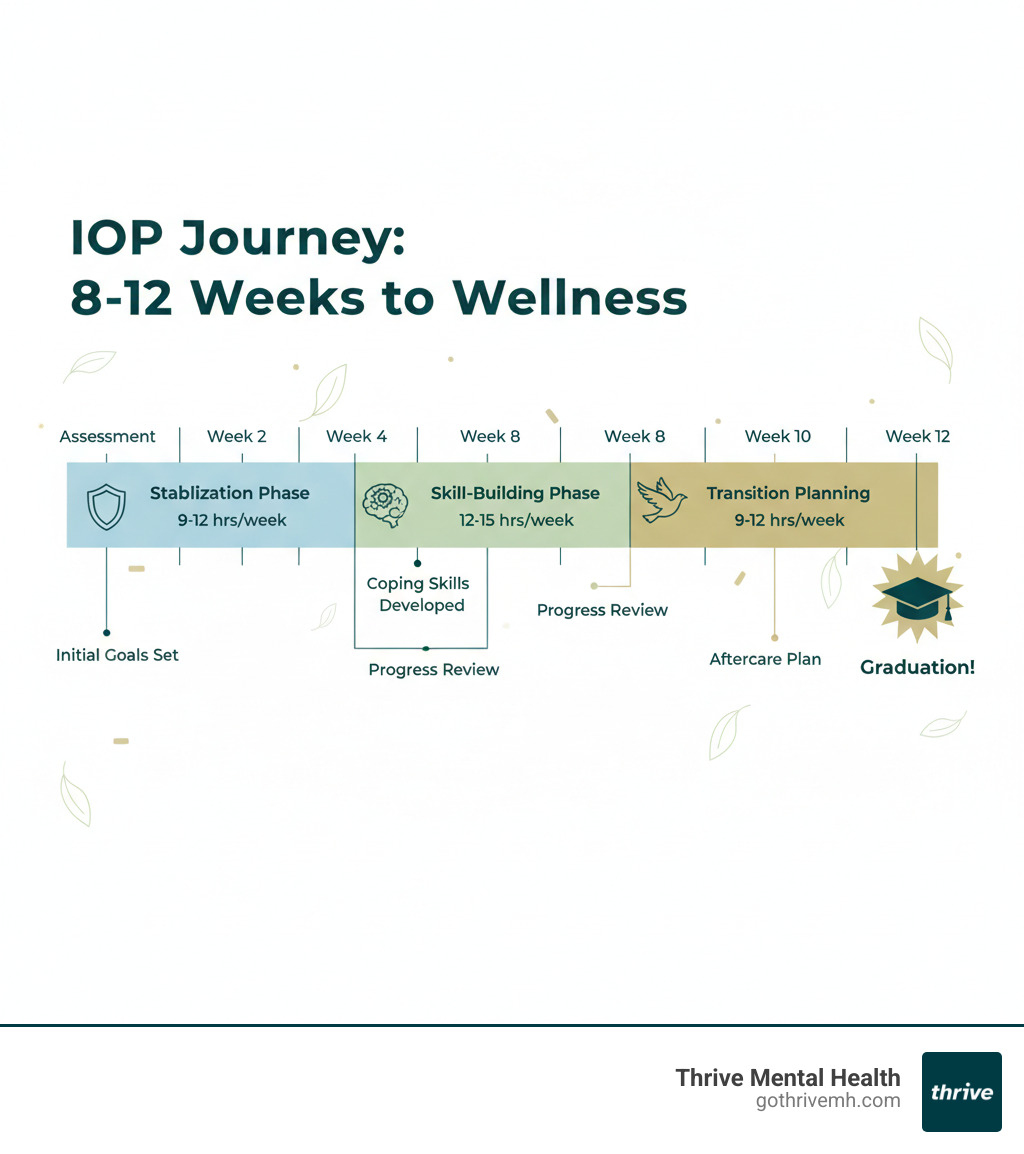Clocking In: How Long to Expect in an Intensive Outpatient Program

How long are intensive outpatient programs: Essential 2025
Why IOP Duration Matters for Your Recovery Journey
How long are intensive outpatient programs? Most IOPs last 8-12 weeks, but your program length depends on your unique needs, progress, and treatment goals.
Quick Answer:
- Typical Duration: 8-12 weeks
- Range: 2 weeks to 6+ months
- Weekly Commitment: 9-15 hours across 3-5 days
- Best Outcomes: Programs lasting at least 90 days
- Factors: Severity of symptoms, co-occurring disorders, individual progress
When you’re struggling with mental health challenges, you need effective treatment that fits your life. Unlike inpatient care that requires you to step away completely, or weekly therapy that may not be enough, IOPs offer intensive healing while you maintain your job, relationships, and daily routine.
The research is clear: programs that last at least 90 days produce the best results. But your journey is unique. Some people thrive in shorter 8-week programs, while others with complex needs or co-occurring disorders may benefit from extended care lasting several months.
I’m Anna Green, LMHC, LPC, Chief Clinical Officer at Thrive Mental Health, where I’ve spent years developing IOP programs for Floridians that balance evidence-based care with real-world flexibility. Understanding how long are intensive outpatient programs is crucial for setting realistic expectations and planning your path to recovery.

What Is an Intensive Outpatient Program (IOP)?
If weekly therapy isn’t providing enough support, but leaving your job or family for inpatient treatment feels overwhelming, an Intensive Outpatient Program (IOP) is the perfect middle ground.
An IOP is structured, non-residential therapy that provides comprehensive mental health treatment several times a week. You get to sleep in your own bed and maintain your daily responsibilities, bridging the gap between once-a-week sessions and full-time residential care. IOPs offer the flexibility to attend work or school while receiving intensive support, whether you’re stepping down from inpatient care or stepping up from traditional therapy.
At Thrive Mental Health, our Florida-based programs involve 9-15 hours of treatment per week over 3-5 days, including group therapy, individual counseling, and skill-building. For a deeper dive, check out Thrive’s IOP services or explore What to Expect in an Intensive Outpatient Program.
How IOP Provides a Bridge in Mental Healthcare
IOPs uniquely balance independence and support. You learn coping skills in a therapeutic environment and immediately apply them in your real world—at work, at home, and with friends.
This real-world skill application is key. You aren’t isolated from your triggers; you learn to manage them with professional guidance and peer support. This approach is highly effective for preventing relapse because you practice recovery skills in the exact environment where you’ll need them most.
IOPs excel at building coping mechanisms that stick. For example, you can learn a new anxiety technique in group therapy on Tuesday, practice it during a stressful work meeting on Wednesday, and then process the outcome in your next session. This immediate feedback loop accelerates healing and builds confidence.
The supportive community aspect can’t be overlooked either. Many people find that connecting with others who understand their struggles becomes a cornerstone of their recovery journey. To learn more about these advantages, explore The Benefits of an Intensive Outpatient Program.
How Long Are Intensive Outpatient Programs on Average?
When people ask me “how long are intensive outpatient programs?” I understand the urgency behind that question. You’re ready to get better, but you also need to plan your life around treatment. The honest answer is that most IOPs last 8-12 weeks, but your journey might look different.

Here’s what I see in practice: some people make incredible progress in just 2 weeks, while others benefit from 6 months or more of structured support. The key isn’t rushing to finish—it’s getting the right amount of care for lasting change.
Research consistently shows that programs lasting at least 90 days produce the best outcomes. This gives you time to not just learn new coping skills, but actually practice them until they become second nature. Think of it like learning to drive—you need enough time behind the wheel to feel confident navigating on your own.
What’s encouraging is that research shows IOP is as effective as inpatient care for many people seeking treatment. You’re not getting “lesser” care by choosing an outpatient program—you’re getting the right level of care for your needs.
Factors That Determine Your IOP Timeline
Your IOP timeline is as unique as you are. During our initial assessment, we look at several key factors that help us estimate how long your program might last.
Severity of symptoms plays a major role in determining length. If you’re dealing with severe depression that’s made it hard to function for months, you’ll likely need more time than someone experiencing a recent bout of anxiety. There’s no shame in needing more support—it just means we’re being thorough.
Co-occurring disorders often extend treatment duration, and for good reason. When you’re managing both mental health challenges and substance use issues, we need to address how these conditions interact with each other. Treating just one while ignoring the other rarely leads to lasting recovery.
Individual progress is perhaps the most important factor. Some people are ready to implement changes quickly, while others need more time to process and integrate new skills. Your treatment team will regularly check in with you about your progress and adjust your timeline accordingly.
Your support system at home makes a significant difference too. If you have family and friends cheering you on, you might move through treatment more quickly. If your home environment has triggers or stressors, we might recommend a longer program to build stronger coping strategies.
Insurance coverage can sometimes influence duration, though most major plans in Florida, including Cigna, Optum, and Florida Blue, cover IOP services. We work closely with insurance providers to ensure you get the care you need within your benefits.
How Long Are Intensive Outpatient Programs for Co-Occurring Disorders?
When you’re dealing with both mental health challenges and substance use—what we call co-occurring disorders or dual diagnosis—your IOP journey typically requires more time and specialized care.
Here’s why: these conditions often feed off each other. Depression might lead to drinking, which worsens the depression, creating a cycle that takes time to break. We use an integrated care approach, meaning we treat both conditions simultaneously rather than trying to tackle them separately.
This comprehensive strategy often means a potentially longer duration in treatment. Someone managing both PTSD and alcohol use disorder might need several additional weeks or months compared to someone with depression alone. But this extra time isn’t a setback—it’s an investment in addressing the root of the problem rather than just the surface symptoms.
The good news is that when we treat co-occurring disorders properly, the results are incredibly powerful. You’re not just managing symptoms—you’re building a foundation for long-term recovery. For more information about these complex conditions, the National Institute of Mental Health offers valuable insights. At Thrive, we specialize in providing this integrated approach through our Intensive Outpatient Program Mental Health services for Florida residents.
What Does a Typical IOP Schedule and Therapy Look Like?
Understanding how long are intensive outpatient programs is only part of the picture – knowing what your days will actually look like is equally important. The beauty of an IOP lies in its structured yet flexible schedule, designed to fit around your life rather than forcing you to put everything on hold.
Most IOPs require a time commitment of 9 to 15 hours per week, typically spread across 3 to 5 days. Each session usually lasts around 3 hours – long enough to dive deep into therapeutic work, but not so long that it completely disrupts your day. Think of it as a part-time commitment to your mental health that can yield full-time benefits.
This design is intentional. You might attend sessions on Monday, Wednesday, and Friday mornings, then head to work for the afternoon. Or perhaps Tuesday, Thursday, and Saturday evenings work better with your schedule. Many of our clients across Florida appreciate this flexibility, especially with our virtual options that eliminate commute time entirely.
The real magic happens in how this schedule allows you to practice what you learn in real time. You’re not waiting a full week between therapy sessions to apply new coping skills – you’re learning them in group on Wednesday and testing them out at work on Thursday. This immediate application strengthens your recovery and builds confidence in your new abilities.
Our Virtual Intensive Outpatient Programs take this flexibility even further, offering both morning and evening options accessible to anyone in Florida. You can maintain your career, family responsibilities, and social connections while receiving the intensive support you need.

Therapies and Skills You’ll Gain in an IOP
Within those structured hours each week, you’ll engage in a carefully designed mix of therapies and skill-building activities. Group therapy forms the heart of most IOPs – there’s something powerful about sitting with others who truly understand your struggles. You’ll share experiences, offer support, and learn from people who’ve walked similar paths. It’s where isolation transforms into connection and shame melts into understanding.
Your individual counseling sessions provide the personal attention your unique situation deserves. Here, you’ll work one-on-one with a therapist to address specific challenges, develop personalized coping strategies, and track your progress. These sessions complement the group work, allowing for deeper exploration of personal issues.
Many programs include family therapy when appropriate. After all, mental health challenges don’t exist in a vacuum – they affect relationships and family dynamics. These sessions help improve communication, resolve conflicts, and build stronger support systems at home.
The therapeutic approaches you’ll encounter are grounded in evidence-based practices. Cognitive Behavioral Therapy (CBT) helps you identify and change negative thought patterns that fuel anxiety, depression, or other struggles. Dialectical Behavior Therapy (DBT) teaches practical skills for managing intense emotions, improving relationships, and tolerating distress without making things worse.
Psychoeducation sessions provide the knowledge that empowers your recovery. Understanding how anxiety affects your brain, or learning about the cycle of addiction, helps explain your experiences and reduces self-blame. Relapse prevention training is crucial for those with substance use concerns, teaching you to identify triggers and develop solid strategies for staying on track.
Perhaps most importantly, you’ll gain life skills that extend far beyond managing symptoms. Stress management techniques, problem-solving strategies, communication skills, and healthy lifestyle habits become part of your toolkit for long-term wellbeing.
These comprehensive approaches align with expert recommendations from resources like the SAMHSA guidelines on IOP clinical issues, ensuring you receive high-quality, effective care that’s backed by research and clinical experience.
IOP vs. Other Levels of Care: Finding the Right Fit
Understanding how long are intensive outpatient programs in comparison to other treatment options helps clarify if an IOP is the right fit for your needs. Mental health treatment exists on a continuum, with different levels of care offering varying intensities of support.
Think of it like choosing the right tool for the job. You wouldn’t use a sledgehammer to hang a picture frame, and you wouldn’t try to demolish a wall with a regular hammer. Similarly, your mental health needs determine which level of care will be most effective.
Inpatient treatment is the most intensive option, providing 24/7 medical and clinical supervision. You’ll live at the facility for weeks to months, making it ideal for crisis stabilization, severe symptoms requiring constant monitoring, or situations where your home environment isn’t safe. It’s comprehensive but completely disrupts your daily life.
Partial Hospitalization Programs (PHP) offer a middle ground. You’ll spend 5-8 hours a day in structured treatment for typically 2-4 weeks, but return home each evening. This works well as a step-down from inpatient care or when you need daily structure but don’t require round-the-clock supervision.
Intensive Outpatient Programs provide the flexibility many people need. With 3-5 hours of treatment, 3-5 days per week over 8-12 weeks, you can maintain work, school, and family responsibilities while receiving substantial support. It’s perfect for those who need more than weekly therapy but can function safely in their daily lives.
| Feature | Inpatient Treatment | PHP | IOP |
|---|---|---|---|
| Level of Care | Highest (24/7 supervision) | High (daily structure) | Moderate-High (weekly structure) |
| Time Commitment | 24/7 (weeks to months) | 5-8 hours/day, 5 days/week | 3-5 hours/day, 3-5 days/week |
| Living Situation | Live at facility | Live at home | Live at home |
| Ideal Candidate | Crisis, severe symptoms, unsafe home | Step-down from inpatient, needs daily structure | Stable home, needs flexibility |
For a deeper dive into these distinctions, our guide on PHP vs IOP: Understanding the Differences breaks down which option might work best for your situation.
Who Is a Good Candidate for an IOP?
You’re likely a strong candidate if you need more support than traditional weekly therapy can provide. Maybe you’ve been going to therapy for months but still struggle with panic attacks at work, or your depression symptoms interfere with daily functioning despite regular sessions.
The key requirement is that you don’t need constant supervision. You’re medically stable, not at immediate risk of harming yourself or others, and can safely steer your days between treatment sessions. This doesn’t mean you’re “fine” – it means you’re stable enough to benefit from the real-world application that makes IOPs so effective.
Having a stable and supportive home environment is crucial. If your living situation is chaotic, filled with triggers, or lacks basic safety, you might benefit from a higher level of care first. IOPs work best when you have a foundation to return to each day.
Most importantly, you need to be able to function in daily life while managing your mental health challenges. This might mean you can still get to work even when anxiety is high, or you can care for your children despite struggling with depression. You don’t have to be functioning perfectly – just enough to engage meaningfully in treatment.
If you’re wondering whether this level of care matches your needs, our resource on Finding Quality IOP Programs in Florida: A Guide can help you assess your situation and explore your options.
Life After IOP: Planning for Continued Success
Graduating from an IOP isn’t crossing a finish line—it’s stepping through a doorway into the next chapter of your recovery story. The skills you’ve built, the connections you’ve made, and the confidence you’ve gained become the foundation for everything that comes next.
Aftercare planning is where the magic really happens. Your treatment team doesn’t just wave goodbye and wish you luck. Instead, they work closely with you to create a personalized roadmap for the months and years ahead. This step-down process is carefully designed to maintain your momentum while gradually reducing the intensity of support.
Think of it like learning to ride a bike. First, you had training wheels (maybe inpatient care), then someone held the back of the bike (your IOP), and now you’re ready to pedal on your own—but with a clear path ahead and people cheering you on from the sidelines.
Relapse prevention strategies become your toolkit for navigating life’s inevitable challenges. You’ll identify your personal warning signs, create action plans for difficult situations, and practice the coping skills that worked best for you during treatment. It’s not about being perfect; it’s about being prepared.
Many programs offer alumni programs that keep you connected to your treatment community. These might include monthly check-ins, social events, or ongoing support groups. There’s something powerful about staying in touch with people who truly understand your journey.
Support groups—whether through your treatment center, community organizations, or peer-led meetings—provide ongoing connection and accountability. They remind you that recovery is a shared experience, not a solo adventure.

How Long Are Intensive Outpatient Programs Part of Your Journey?
Here’s the beautiful truth about recovery: how long are intensive outpatient programs part of your life extends far beyond the official graduation date. While your structured IOP might last 8-12 weeks, the impact ripples through years of growth and healing.
Most people transition to outpatient therapy after completing their IOP—maybe meeting with a therapist once or twice a week instead of multiple times. It’s like having a trusted guide available as you continue exploring new territory, but at your own pace.
Utilizing community resources becomes second nature. You might find local mental health centers, wellness programs, or hobby groups in your Florida community that support your ongoing well-being. The skills you learned in IOP help you recognize which resources truly serve you.
For those in recovery from substance use, 12-step programs or other peer support groups often become a cornerstone of long-term success. These communities offer structure, sponsorship, and the kind of understanding that only comes from shared experience.
Building a long-term support network might be the most lasting gift of your IOP experience. The relationships you form—with peers, therapists, and even family members who participated in your treatment—create a web of support that can catch you if you stumble and celebrate with you as you soar.
The investment you make in your mental health during an IOP doesn’t have an expiration date. Years later, you might find yourself using a breathing technique you learned in group therapy, or reaching out to a friend you met in treatment during a tough week. That’s the real answer to how long IOPs are part of your journey—they become part of who you are.
Recovery is ongoing, and that’s not a burden—it’s a gift. It means you’re always growing, always learning, and always becoming more yourself. The Benefits of Utilizing Mental Health Services continue to unfold throughout your life, creating possibilities you might never have imagined when you first walked through the doors of treatment.
Frequently Asked Questions about IOP Duration and Logistics
Can I keep my job while attending an IOP?
Absolutely. One of the biggest advantages of an IOP is its flexibility. Programs are designed to work around your existing commitments, not replace them. Thrive Mental Health offers virtual and hybrid programs with both morning and evening sessions, allowing clients to maintain their careers, education, and family life while receiving intensive support.
Is an Intensive Outpatient Program covered by my insurance?
Yes, most major insurance plans in Florida, including Cigna, Optum, Aetna, and Florida Blue, typically cover IOP services. Your specific benefits depend on your plan. Thrive Mental Health can verify your benefits quickly, with no obligation. We are an in-network provider for many plans in Florida and also accept Florida Medicaid where applicable.
How do I know when I am ready to graduate from an IOP?
Graduation is a collaborative decision between you and your treatment team based on achieving your personal treatment goals. You’re likely ready when you consistently use your new coping skills in real-world situations, your symptoms have significantly improved, and you feel confident managing your mental health with a strong support system in place. The goal is lasting success, not rushing to finish.
Your Path to Healing Starts Here
The question of how long are intensive outpatient programs doesn’t have a one-size-fits-all answer—and that’s the beauty of it. Your IOP duration is customized to your unique needs, circumstances, and recovery goals, ensuring you receive the right amount of support for lasting healing.
While most programs span 8-12 weeks, what matters most isn’t the calendar but your personal progress. Some individuals find their footing in 8 weeks, while others benefit from extended care. The key is working with your treatment team to determine what best serves your recovery.
At Thrive Mental Health, we understand that life doesn’t pause for healing. Our flexible virtual and hybrid IOP programs are designed to work around your schedule, making them accessible to residents throughout Florida. Our morning and evening options ensure you can access intensive support while maintaining your work, family, and educational commitments.
The skills you develop—from managing anxiety to building healthier coping strategies—are tools you’ll carry long after graduation. Your program length is the foundation; your recovery journey continues to strengthen with each passing day.
Ready for support in Florida? Thrive offers virtual and hybrid IOP/PHP with evening options. Verify your insurance in 2 minutes (no obligation) → Start benefits check or call our Florida-based team at 561-203-6085. If you’re in crisis, call/text 988.